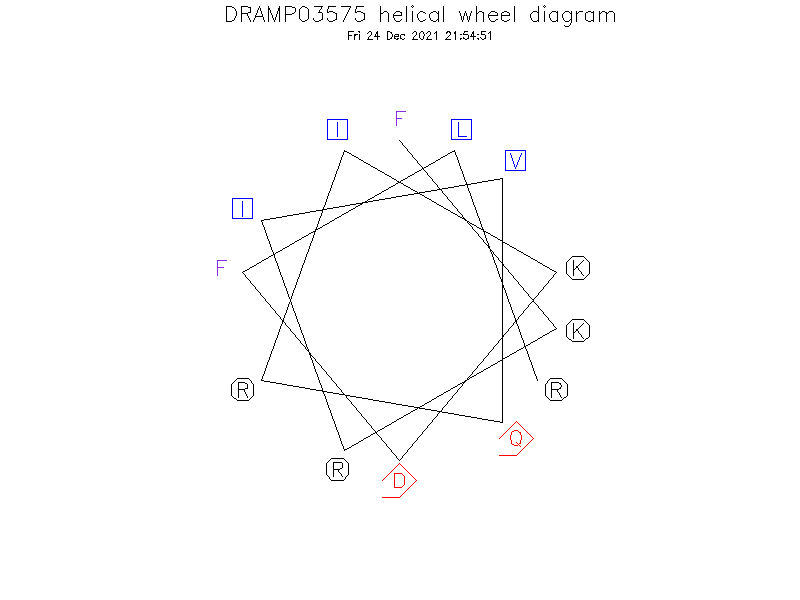General Information
-
DRAMP ID
- DRAMP03575
-
Peptide Name
- LL-37(17-29) (C-terminal fragment of LL-37, LL; Human, mammals, animals)
-
Source
- Homo sapiens
-
Family
- Belongs to truncated LL-37.
-
Gene
- Not found
-
Sequence
- FKRIVQRIKDFLR
-
Sequence Length
- 13
-
UniProt Entry
- P49913
-
Protein Existence
- Protein level
Activity Information
-
Biological Activity
- Antimicrobial, Antibacterial, Anti-Gram+, Anti-Gram-, Anti-cancer
-
Target Organism
-
- [Ref.16637646] Gram-negative bacterium: Escherichia coli K12(MIC=40 μM);
- Drug-resistant KBv cancer cells (LC50=60 μM), Drug-sensitive KB cancer cells (LC50=57 μM).
- [Ref.28178190]Gram-positive bacteria: Staphylococcus aureus ATCC 29213 (MIC=16 μM), S. faecalis ATCC 29212 (MIC=32 μM), Bacillus subtilis CMCC 63501 (MIC=16 μM), Staphylococcus epidermidis ATCC 12228 (MIC=8 μM);
- Gram-negative bacteria: Escherichia coli ATCC 25922 (MIC=16 μM), Escherichia coli UB 1005 (MIC=16 μM), Pseudomonas aeruginosa ATCC 27853 (MIC=8 μM), Pseudomonas aeruginosa PAO1 (MIC=16 μM), Salmonella typhimurium ATCC 14028 (MIC=32 μM), Salmonella typhimurium ATCC 7731 (MIC=16 μM). [Ref.23894079] Gram-positive bacteria : Staphylococcus aureus (ATCC 29213)(MIC=40 μM);
- Gram-negative bacteria : Escherichia coli (ATCC 25922)(MIC=5 μM)
-
Hemolytic Activity
-
- [Ref.28161291] HC50>256 μM against human red blood cells. [Ref.23894079] MHC10=160 μM against human red blood cells
-
Cytotoxicity
-
- Not included yet
-
Binding Target
- Not found
Structure Information
-
Linear/Cyclic
- Not included yet
-
N-terminal Modification
- Not included yet
-
C-terminal Modification
- Not included yet
-
Nonterminal Modifications and Unusual Amino Acids
- Not included yet
-
Stereochemistry
- Not included yet
-
Structure
- Alpha helix##Random coil
-
Structure Description
- Not found
-
Helical Wheel Diagram
-
PDB ID
- 2FBS resolved by NMR.
-
Predicted Structure
- There is no predicted structure for DRAMP03575.
Physicochemical Information
-
Formula
- C80H135N25O17
Absent Amino Acids
- ACEGHMNPSTWY
Common Amino Acids
- R
Mass
- 1719.11
PI
- 11.72
Basic Residues
- 5
Acidic Residues
- 1
Hydrophobic Residues
- 6
Net Charge
- +4
-
Boman Index
- -45.36
Hydrophobicity
- -0.439
Aliphatic Index
- 112.31
Half Life
-
- Mammalian:1.1 hour
- Yeast:3 min
- E.coli:2 min
Extinction Coefficient Cystines
- 0
Absorbance 280nm
- 0
Polar Residues
- 0
DRAMP03575
Comments Information
Function
- LL-37(17-29) became slightly less active than the longer ones, indicating that the truncated hydrophobic residues L31 and V32 also play a role in interaction with human cells. Antibacterial activity against the Gram-negative bacteria and Gram-positive bacteria.
Literature Information
- ·Literature 1
-
Title
- Solution structures of human LL-37 fragments and NMR-based identification of a minimal membrane-targeting antimicrobial and anticancer region.
-
Pubmed ID
- 16637646
-
Reference
- J Am Chem Soc. 2006 May 3;128(17):5776-5785.
-
Author
- Li X, Li Y, Han H, Miller DW, Wang G.
- ·Literature 2
-
Title
- High Specific Selectivity and Membrane-Active Mechanism of Synthetic Cationic Hybrid Antimicrobial Peptides Based on the Peptide FV7.
-
Pubmed ID
- 28178190
-
Reference
- Int J Mol Sci. 2017 Feb 6;18(2). pii: E339.
-
Author
- Tan T, Wu D, Li W, Zheng X, Li W, Shan A.
- ·Literature 3
-
Title
- LL-37-derived membrane-active FK-13 analogs possessing cell selectivity, anti-biofilm activity and synergy with chloramphenicol and anti-inflammatory activity.
-
Pubmed ID
- 28161291
-
Reference
- Biochim Biophys Acta Biomembr. 2017 May;1859(5):722-733.
-
Author
- Rajasekaran G, Kim EY, Shin SY
- ·Literature 4
-
Title
- Disruption of interactions between hydrophobic residues on nonpolar faces is a key determinant in decreasing hemolysis and increasing antimicrobial activities of α-helical amphipathic peptides.
-
Pubmed ID
- 23894079
-
Reference
- ChemMedChem. 2013 Oct;8(10):1638-42.
-
Author
- Son M, Lee Y, Hwang H, Hyun S, Yu J

